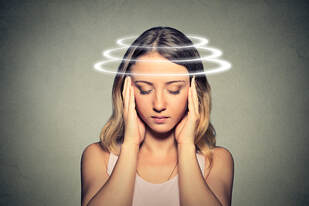upper cervical blogdr. blom Work Specifically in the neck and neck related disorders?
|
 Some people who visit chiropractors for vertigo relief in Boise ID often use these two terms interchangeably, thinking they are one and the same. Let’s get things straight once and for all. No, vertigo and dizziness are not the same. You must understand their difference and know which of the two you are dealing with to get the right care you need. Learning the Difference Between Dizziness and Vertigo Dizziness Dizziness is a range of sensations that can mean feeling weak, unsteady, disoriented, or lightheaded. This is what you feel when you are near fainting or passing out. You may feel dizzy spells when you are in any of these situations:
Vertigo Vertigo, on the other hand, is the improper sensation of spinning. In vertigo, there is always the rotational component when you feel a sense of movement. You may feel yourself or your environment whirling even when you are just standing still. Dizziness is not necessarily a vertigo symptom, but vertigo patients may experience it one way or another. Dizziness and vertigo may be different, but they share some things in common, such as they can both affect your sense of balance and are possible symptoms of an underlying condition. More or less, 50% of patients who complain of dizziness actually have vertigo. Whether you have vertigo or dizziness, you must be clear about your symptoms when you consult a doctor. Your descriptions and input will directly impact your diagnosis and chance to get vertigo relief in Boise ID. To learn more about the connection between head and neck injuries and vertigo, download our complimentary e-book by clicking the image below. 5 Things That Can Cause Vertigo and Dizziness
1. Inner ear problems The frequent cause of vertigo is the inner ear disorder called BPPV (benign paroxysmal positional vertigo). It develops when tiny calcium particles in the inner ear travel in the ear canal where they should not stay. As a result, they stimulate the various nerves and sensors within the ear that relay information about the body’s balance, transmitting false signals that cause the feeling of vertigo. 2. Dehydration When your body lacks adequate amounts of fluids, your blood pressure may drop, causing dizziness. 3. Medications Several prescription medications come with dizziness or vertigo as side effects. For this reason, you must always check your medicine. If you notice you have these symptoms, discuss with your doctor about possible options to avoid or minimize these side effects. 4. Waterbeds or big ships Laying on top of a waterbed or riding in a large vessel for hours can bring about the feeling dizzy or off-balance, most especially after getting off from a ship. The term for it is mal de debarquement, and the sensation may last for a couple of months. 5. Migraines This may come as a surprise for some, but migraines can also cause vertigo. About 40% of people with migraines also experience vertigo symptoms or dizzy spells. People who experience both are dealing with vestibular migraines (migraine-associated vertigo). The Balance System of the Body Vertigo patients can choose from a variety of care options for their symptoms, ranging from diuretics and therapies to prescription medications and a low-sodium diet. However, out of all these, nothing successfully provided long-term results to patients while addressing the root of vertigo. Fortunately, there is one form of care that can potentially do, and we will talk about its full details later. First, let’s touch on an important topic: the body’s balance system. To figure out the lasting resolution for vertigo, it is crucial to know how the body works. How does the body keep its balance? What are the systems working together to achieve it? These are the three vital parts:
These body parts and systems join forces to relay input about the body’s position, spatial orientation, and movements to the brain. Then, the brain reciprocates with information to sustain the body’s balance. Therefore, interruption or malfunction of any of these parts can result in dizziness or vertigo. Natural Care and Vertigo Relief in Boise ID To sum things up, these three systems must work at their full capacity without disruption, so the body does not experience recurring bouts of vertigo. A great step to ensure they are functioning as they should is by consulting an upper cervical chiropractor. Taking care of the upper cervical spine has helped many people with vertigo in various case studies. The two topmost bones of the spine, the atlas and the axis impact the nerves that transmit signals to the brain, therefore directly influencing your balance system. If there is a misalignment in these two bones, you can expect interruptions in the sensory input entering and leaving the brain. Besides, as these bones are very near the eustachian tube of the inner ear, their misalignment can cause bouts of vertigo. Here at Upper Cervical Health Centers Boise in Idaho, our chiropractor can examine and see if you have an upper cervical misalignment. Once confirmed, Dr. Grayson Blom will employ very gentle and specific adjustments to your atlas bone to restore your correct upper cervical alignment. These safe and meticulous adjustments hold in place for long, allowing the muscles and tissue to recover and repair. If the upper spine remains in proper alignment, you can improve the communication between your nerves and the brain. This is the exact way upper cervical chiropractic care can offer lasting vertigo relief in Boise ID for all patients. To schedule a consultation with Dr. Blom, call 208-559-0541, or just click the button below.
0 Comments
Your comment will be posted after it is approved.
Leave a Reply. |
Dr. BlomUpper Cervical Chiropractor Categories
All
Archives
February 2024
|




 RSS Feed
RSS Feed


